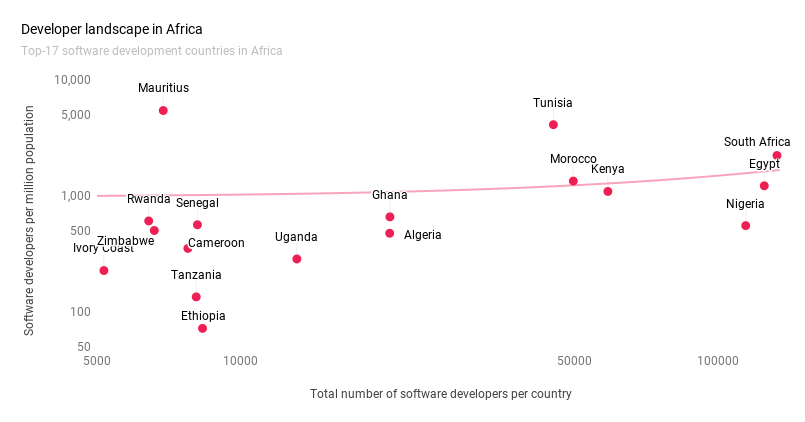This article explored compelling reasons why African tech talents are set to stamp their footprint on the global talent pool and economy.
This article explored compelling reasons why African tech talents are set to stamp their footprint on the global talent pool and economy.
Africa has the world’s youngest and fastest-growing population according to reports by Statista. This high number of young people is the world’s largest source of untapped talent and an opportunity for the continent’s economic growth.
Tech employers who usually troop to Asia and Eastern Europe are turning their attention to Africa to recruit top talents. Since 2016 till now, top executives of global tech companies like Mark Zuckerberg; Sundar Pichai; Jack Dorsey; Nat Friedman have visited the continent and stated their plans for collaboration and strategic partnerships.
Furthermore, global big tech organisations have functional centres in Africa. Corporations such as Twitter, Google, ICANN, Amazon, Starlink, Facebook, Microsoft, Apple, Alibaba Group. Some of these big tech corporations are not only recruiting from Africa but they are relocating these talents to their countries.
What’s more? Over the past few years, a growing list of established Africa-based startups are expanding beyond Africa to compete in other markets. Swvl, the Egyptian bus-hailing service operates in 135 cities in 20 countries across Latin America, Europe, Africa and Asia (including Pakistan where it currently operates in three cities).
Lidya, a mobile lending app has popped up in the USA, Portugal, Nigeria, Poland and the Czech Republic. More recently, startups like Korapay, Moove, and Bluechip technologies have expanded outside Africa to stamp their footprints in global markets.
On his thoughts about African tech talents, veteran Nigerian startup founder and investor, Olumide Shoyombo said “It is inspiring to see how far we have come. I recall from the early years that many of our startups had developers from India building their first versions. That’s not the case today as the talent pool now exists locally.
Some of these talents have now taken global roles and I see it as a good development. We should see the “japa” phenomenon as an opportunity to produce more of the talent the global marketplace wants. I believe we can do this at a cost advantage to other markets."
Why will African tech talent overtake Asia?
So move over, Asia and Eastern Europe. Here are five reasons why Africa's top tech talents will overtake Asia and are poised to stamp their footprint in the global economy:
Improving Internet connectivity
South Africa has long been held back by slow internet connectivity. The Federal Communications Commission (FCC) calls 25 Mbps broadband speed but African countries have always fallen before this threshold. But that narrative is gradually changing.
Global internet corporations like ICANN and Google’s Equiano are already building data centres and submarine internet cables in Africa. Elon Musk’s Starlink is also set to launch in Nigeria and Mozambique this year. All of these and more will increase the speed and drive down the costs of internet connectivity in the continent.
Language symmetry
Language has been a barrier that stands in the way of employers when they are considering workers overseas. But while it is often difficult to find tech workers fluent in English in India or China, it is widely spoken across Africa.
In fact, English is the official language for business and law in many African states. When coupled with strengthening education systems, Africa has built a solid base of 221 million proficient English speakers.
Compatible business hours
When companies employ remote workers, real-time synchronous communication often becomes difficult as the time zones vary, and it becomes difficult to sync together. Compatible business hours are essential to creating a productive environment.
Asia is 4 hours ahead of Europe and 11 hours ahead of North America. Meanwhile, West African countries are 1 hour ahead of most European countries and 6 hours ahead of North America. This makes collaborations between US and European employers easier with African employees compared to Asians.
Affordable
Africa's growing talent pool serves the global market with affordable services. Speaking to TechCrunch in a recent interview, serial angel investor, Olumide Soyombo, stated since the pandemic has accelerated the need for a global flat workspace, Africa’s quality engineers can work with the big tech companies, 20%-30% less than equally talented engineers in India or Eastern Europe.
In the report issued by Tunga, a Dutch tech-talent outsourcer, in 2021 Africa offers European and US companies affordable coding talent. Although pricing and availability of programmers differ from country to country.
When it comes to tech talents, Africa is a blind spot to many companies. The continent, however, has great potential, as we can tell from investments by big tech companies.

Unemployment
For so long unemployment has been a lingering problem in Africa. The continent has nearly 420 million youths who are unemployed or underemployed. Every year 10 to 12 million youth enter the workforce but only 3.1 million jobs are created.
These circumstances have made most African youths turn to digital skills acquisition due to its low barrier to entry and high earning potential. Furthermore, both public and private sector players have deployed skills acquisition initiatives and partnerships such as Microsoft, Google, AWS, and Mastercard Foundation.
This Africa's expanding talent pipeline driven by a sizable base of fresh-to-the-market youth with a self-starter attitude is ready to serve international and domestic markets at scale. The birthplace of the tech revolution may have started in Palo Alto, but its future will be written in Lagos, Nairobi and the cities of Africa.
“Increased global demand for remote tech talent, which was accelerated by the pandemic, created more remote employment opportunities for African developers,” said Google in its ‘Africa Developer Ecosystem Report 2021.’







Comments ()